Sodium metabisulfite food additives use regulations
"Food Hygiene Standards for the Use of Food Additives" (GB2760) limits the scope or amount of use, and uses sodium metabisulfite food additives, which are prohibited by the "Food Safety Law" Article 36, paragraph 1, "use of food additives that do not meet food safety standards" Behavior; Ramen noodles that use sodium metabisulfite over a wide range, and biscuits that use sodium metabisulfite over a limited amount are foods produced using "food additives that do not meet food safety standards." Li’s distribution of ramen noodles that use sodium metabisulfite in excess of range and biscuits that use sodium metabisulfite in excessive amounts also violated the provisions of Article 36, paragraph 1, of the Food Safety Law. Article (3) shall be investigated and punished.
The violations stipulated in Article 86 (3) of the Food Safety Law that should be investigated and dealt with refer to "the purchase and use of food raw materials, food additives, and food-related products that do not meet the food safety standards by food producers," This provision only applies to food producers, not to food operators. However, foods that use food additives beyond the limits or limits of the "Health Standards for the Use of Food Additives" (GB2760) are products that do not meet the national standards for protecting human health. Therefore, Li’s distribution of ramen with excessive use of sodium metabisulfite and biscuits with excessive use of sodium metabisulfite violated the provisions of Article 13 of the Product Quality Law, and the industry and commerce department should grant it in accordance with Article 49 of the Product Quality Law Investigate.
The scope of use of sodium metabisulfite as a food additive includes biscuits, but not ramen. Therefore, the use of sodium metabisulfite ramen beyond the scope of "Food Safety Law" Article 28 (1) prohibits the production and operation of "adding food additives other than chemical substances and other foods that may endanger human health"; Biscuits with limited use of sodium metabisulfite are "products that do not meet the national standards for the protection of human health" that are prohibited by Article 13 of the "Product Quality Law". The industry and commerce department shall investigate and deal with Li’s distribution of ramen using sodium metabisulfite beyond the scope in accordance with Article 85 (1) of the Food Safety Law; in accordance with Article 49 of the Product Quality Law, Li's distribution of biscuits with excessive use of sodium metabisulfite was investigated and dealt with.

According to Articles 45 and 46 of the Food Safety Law and the “Administrative Measures for New Varieties of Food Additives” of the Ministry of Health, food additives should be technically necessary and proved safe and reliable through risk assessment before they can be Include in the range of permitted use; when producing food, the food additives shall be used in accordance with the provisions of the food safety standards or the provisions on the variety, use range, and dosage of food additives announced by the Ministry of Health. Therefore, whether it is a food additive that is used in an excessive range or a food additive that is used in an over-limit range, it belongs to the "potentially harmful to human health" within the meaning of Article 28 (1) and Article 46 of the Food Safety Law. "Substances"; foods produced using food additives that exceed the limits or dosages are all "foods with substances that may endanger human health". For the distribution of ramen with excessive use of sodium metabisulfite and biscuits with excessive use of sodium metabisulfite, the industry and commerce department shall apply Article 28 (1) and Article 85 (1) of the Food Safety Law Be investigated and punished.
In addition, Article 36, Paragraph 1 of the Food Safety Law, "Food producers are not allowed to purchase or use food additives that do not meet food safety standards" is to require food producers to check the quality and safety of food additives themselves. Here, "food additives that do not meet the food safety standards" refer to certain substances purchased or used by food producers, which are varieties allowed by the state to be used as food additives, but their own quality does not meet the food safety standards. For example, according to the national standard "sodium metabisulfite for food additives" (GB 1893), sodium metabisulfite used as a food additive has a white or slightly yellow crystalline powder, and its component content should meet the following requirements: sodium metabisulfite (based on SO2) ≥ 65.0%, iron (Fe) ≤ 0.005%, water insoluble matter ≤ 0.05%, pH 4.0 to 4.6, heavy metals (calculated as Pb) ≤ 0.002%, arsenic (As) ≤ 0.0002%. If the sodium metabisulfite purchased by the biscuit producer does not meet the above requirements, it violates the provisions of Article 36, Paragraph 1 of the Food Safety Law, and belongs to Article 86 (3) of the Food Safety Law ) Stipulated in the item should be investigated and dealt with "food producers purchase or use food additives that do not meet food safety standards" behavior. Therefore, those who use food additives that exceed the range or limit in food production and distribute foods that use food additives that exceed the range or limit should not apply Article 36, paragraph 1, and Article 86 of the Food Safety Law Item (3) should be investigated and handled by the quality inspection or industrial and commercial department according to the division of responsibilities according to Article 28 (1) and Article 85 (1) of the Food Safety Law.

